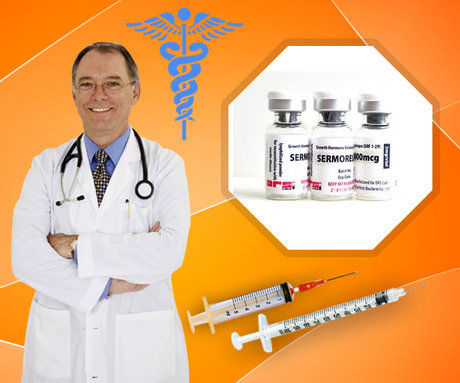Introduction to Peptides and Hair Loss
Hair loss, a common concern among American males, can significantly impact self-esteem and quality of life. While various treatments exist, the exploration of peptides as a potential solution has garnered increasing attention in the scientific community. Peptides, short chains of amino acids, are fundamental building blocks of proteins and play crucial roles in numerous biological processes, including hair growth.
The Science Behind Peptides and Hair Growth
Peptides influence hair growth through their interaction with hair follicle cells. Specifically, certain peptides can stimulate the anagen phase of the hair growth cycle, which is the active growth period. One such peptide, GHK-Cu (copper tripeptide-1), has been shown to promote hair follicle proliferation and increase hair density in preclinical studies. This peptide works by enhancing the production of extracellular matrix proteins, which are essential for maintaining the structural integrity of hair follicles.
Another peptide of interest is PTD-DBM, which has demonstrated the ability to prolong the anagen phase and delay the onset of the catagen phase, the transitional phase where hair growth ceases. By extending the active growth period, PTD-DBM can potentially lead to thicker, healthier hair.
Clinical Evidence Supporting Peptide Use
Clinical trials have begun to shed light on the efficacy of peptides in treating hair loss. A study published in the *Journal of Cosmetic Dermatology* found that a topical solution containing GHK-Cu significantly increased hair density and thickness in men with androgenetic alopecia after six months of use. Participants reported not only visible improvements but also enhanced hair strength and reduced hair fall.
Similarly, a pilot study on PTD-DBM showed promising results, with participants experiencing a noticeable increase in hair growth and a reduction in hair loss. These findings suggest that peptides could be a valuable addition to the arsenal of treatments available for male pattern baldness.
Mechanisms of Action
The mechanisms by which peptides promote hair growth are multifaceted. GHK-Cu, for instance, not only stimulates hair follicle proliferation but also possesses anti-inflammatory properties, which can be beneficial in reducing scalp inflammation often associated with hair loss. Additionally, GHK-Cu enhances the production of vascular endothelial growth factor (VEGF), which improves blood flow to the scalp, thereby nourishing hair follicles.
PTD-DBM, on the other hand, works by inhibiting the activity of transforming growth factor-beta (TGF-?), a protein that can induce the catagen phase. By blocking TGF-?, PTD-DBM helps maintain the anagen phase, allowing for prolonged hair growth.
Safety and Side Effects
While peptides show promise, it is essential to consider their safety profile. To date, clinical studies have reported minimal side effects associated with peptide-based treatments. Common side effects include mild scalp irritation and itching, which typically resolve on their own. However, as with any treatment, it is crucial for individuals to consult with a healthcare provider before starting a new regimen.
Future Directions in Peptide Research
The field of peptide research for hair loss treatment is still in its infancy, with much to be explored. Future studies will need to focus on optimizing peptide formulations, determining the most effective dosages, and understanding long-term effects. Additionally, combining peptides with other established treatments, such as minoxidil or finasteride, could potentially enhance their efficacy.
Conclusion: The Promise of Peptides in Hair Loss Treatment
Peptides represent a promising frontier in the treatment of male hair loss. With their ability to stimulate hair growth and improve hair density, peptides offer a novel approach that could complement existing therapies. As research continues to advance, American males may soon have access to more effective and personalized solutions for combating hair loss, ultimately improving their confidence and quality of life.
Contact Us For A Fast And Professional Response

- Peptide Primer: Getting a Boost From Peptides [Last Updated On: March 22nd, 2025] [Originally Added On: January 6th, 2021]
- Peptide YY Function and Therapeutic Potential [Last Updated On: August 16th, 2024] [Originally Added On: September 6th, 2021]
- Tesamorelin Testimonial by Vincent "Coach Vinny" Jones [Last Updated On: January 25th, 2025] [Originally Added On: July 21st, 2022]
- BPC-157: A Potent Peptide Therapy for Men’s Hormone Health [Last Updated On: January 26th, 2025] [Originally Added On: July 26th, 2022]
- Unveiling the Anti-Aging Secrets: The Role of Peptides in Modern Medicine [Last Updated On: February 16th, 2025] [Originally Added On: February 16th, 2025]
- Peptides and Epigenetics: Enhancing American Men's Health and Disease Prevention [Last Updated On: February 19th, 2025] [Originally Added On: February 19th, 2025]
- Peptide Innovations: Transforming Allergy Management in American Males [Last Updated On: February 28th, 2025] [Originally Added On: February 28th, 2025]
- The Unveiling Frontier: Peptides in the Panorama of Future Medicine [Last Updated On: March 2nd, 2025] [Originally Added On: March 2nd, 2025]
- Exploring the Role of Peptides in Diabetes Management: Advancements and Future Directions [Last Updated On: March 3rd, 2025] [Originally Added On: March 3rd, 2025]
- Peptide Therapeutics: Transforming Neurological Disorder Treatments in American Males [Last Updated On: March 4th, 2025] [Originally Added On: March 4th, 2025]
- Peptide-Based Immunotherapy: Revolutionizing Treatment for American Men's Health [Last Updated On: March 5th, 2025] [Originally Added On: March 5th, 2025]
- Exploring Peptide Therapy in Men's Health: Applications and Future Directions [Last Updated On: March 6th, 2025] [Originally Added On: March 6th, 2025]
- Peptide-Based Antimicrobials: Targeted Solutions for American Men's Health Challenges [Last Updated On: March 7th, 2025] [Originally Added On: March 7th, 2025]
- Peptides: The Key to Men's Youthful Skin - Dermatological Insights and Benefits [Last Updated On: March 8th, 2025] [Originally Added On: March 8th, 2025]
- Revolutionizing Men's Health: Harnessing Biomimetic Peptides for Tissue Regeneration and Healing [Last Updated On: March 9th, 2025] [Originally Added On: March 9th, 2025]
- Advancements in Therapeutic Proteins and Peptides: Navigating Challenges for American Men's Health [Last Updated On: March 12th, 2025] [Originally Added On: March 12th, 2025]
- Unlocking the Potential of Peptides in Precision Medicine for American Males [Last Updated On: March 13th, 2025] [Originally Added On: March 13th, 2025]
- Unlocking the Power of Peptides: Revolutionizing Wound Healing and Tissue Repair in American Males [Last Updated On: March 15th, 2025] [Originally Added On: March 15th, 2025]
- Peptides and Metabolic Health: A New Frontier for American Males [Last Updated On: March 16th, 2025] [Originally Added On: March 16th, 2025]
- Peptide Therapies: A New Hope for Managing Obesity in American Men [Last Updated On: March 18th, 2025] [Originally Added On: March 18th, 2025]
- Peptides in Veterinary Medicine: Innovations for American Male Veterinarians [Last Updated On: March 18th, 2025] [Originally Added On: March 18th, 2025]
- Peptide and Stem Cell Synergy: Revolutionizing Regenerative Medicine for American Males [Last Updated On: March 18th, 2025] [Originally Added On: March 18th, 2025]
- Peptide Therapeutics: Revolutionizing Chronic Disease Management in American Males [Last Updated On: March 19th, 2025] [Originally Added On: March 19th, 2025]
- Peptides: A New Frontier in Managing Respiratory Health for American Men [Last Updated On: March 21st, 2025] [Originally Added On: March 21st, 2025]
- Peptides: Enhancing Immune Response and Therapy for American Males Against Infections [Last Updated On: March 21st, 2025] [Originally Added On: March 21st, 2025]
- Peptide Vaccines: Advancements, Challenges, and Future for American Males' Immunization [Last Updated On: March 21st, 2025] [Originally Added On: March 21st, 2025]
- Peptides and Gene Therapy: Revolutionizing Men's Health in America [Last Updated On: March 21st, 2025] [Originally Added On: March 21st, 2025]
- Peptides Revolutionizing Eye Care for American Males: Current Research and Future Hope [Last Updated On: March 21st, 2025] [Originally Added On: March 21st, 2025]
- Peptides in Medicine: Enhancing Diagnostics and Drug Delivery for American Males [Last Updated On: March 22nd, 2025] [Originally Added On: March 22nd, 2025]
- Peptides Offer Hope for Managing Neuropathic Pain in American Males [Last Updated On: March 22nd, 2025] [Originally Added On: March 22nd, 2025]
- Peptides Revolutionizing Dental Care for American Males: Healing and Regeneration [Last Updated On: March 23rd, 2025] [Originally Added On: March 23rd, 2025]
- Peptide Therapy: Enhancing Men's Health from Muscle to Cancer Treatment [Last Updated On: March 23rd, 2025] [Originally Added On: March 23rd, 2025]
- Peptide-Enriched Skincare: A Scientific Approach for American Men's Grooming Needs [Last Updated On: March 23rd, 2025] [Originally Added On: March 23rd, 2025]
- Peptides: Enhancing Gut Health and Microbiome Balance in American Males [Last Updated On: March 23rd, 2025] [Originally Added On: March 23rd, 2025]
- Peptide Therapeutics: Targeted Treatments for Rare Diseases in American Males [Last Updated On: March 23rd, 2025] [Originally Added On: March 23rd, 2025]
- Peptides: A New Frontier in Mental Health Treatment for American Males [Last Updated On: March 23rd, 2025] [Originally Added On: March 23rd, 2025]
- Topic Peptides: A Promising New Treatment for Rheumatic Diseases in American Males [Last Updated On: March 23rd, 2025] [Originally Added On: March 23rd, 2025]
- Peptide-Based Biomarkers: Revolutionizing Disease Detection in American Men [Last Updated On: March 23rd, 2025] [Originally Added On: March 23rd, 2025]
- Peptides Revolutionizing Epilepsy Treatment for American Males: New Hope and Insights [Last Updated On: March 23rd, 2025] [Originally Added On: March 23rd, 2025]
- Peptide-Based Biosensors: Revolutionizing Health Monitoring for American Males [Last Updated On: March 24th, 2025] [Originally Added On: March 24th, 2025]
- Peptide Nanotechnology: Revolutionizing Medicine for American Males [Last Updated On: March 24th, 2025] [Originally Added On: March 24th, 2025]
- Peptide Drugs in Pediatrics: Targeted Treatments for Growth and Metabolic Disorders [Last Updated On: March 24th, 2025] [Originally Added On: March 24th, 2025]
- Peptide Radiopharmaceuticals: Revolutionizing Men's Health with Targeted Imaging and Therapy [Last Updated On: March 24th, 2025] [Originally Added On: March 24th, 2025]
- Bioactive Peptides: A New Frontier in Men's Health and Wellness [Last Updated On: March 24th, 2025] [Originally Added On: March 24th, 2025]
- Peptides: A New Frontier in Cardiovascular Disease Prevention for American Men [Last Updated On: March 24th, 2025] [Originally Added On: March 24th, 2025]
- Peptide-Based Anti-venoms: A Promising Leap in Treating Snakebites for American Males [Last Updated On: March 25th, 2025] [Originally Added On: March 25th, 2025]
- Peptides: A New Frontier in Liver Health Management for American Males [Last Updated On: March 25th, 2025] [Originally Added On: March 25th, 2025]
- Peptide Therapy with Topic Peptides for Hematological Disorders in American Males [Last Updated On: March 25th, 2025] [Originally Added On: March 25th, 2025]
- Peptides and Male Fertility: Enhancing Reproductive Health in American Men [Last Updated On: March 25th, 2025] [Originally Added On: March 25th, 2025]
- Peptides: Unlocking Potential in Men's Health and Anti-Aging Treatments [Last Updated On: March 25th, 2025] [Originally Added On: March 25th, 2025]
- Peptide Therapies Enhance Bone Health in American Males: A Comprehensive Overview [Last Updated On: March 25th, 2025] [Originally Added On: March 25th, 2025]
- Next-Generation Peptide Therapies Enhancing Transplant Outcomes in American Males [Last Updated On: March 26th, 2025] [Originally Added On: March 26th, 2025]
- Peptides in Endocrinology: Therapeutic Advances for American Men's Health [Last Updated On: March 26th, 2025] [Originally Added On: March 26th, 2025]
- Peptides: A Promising Solution to Antibiotic Resistance for American Males [Last Updated On: March 26th, 2025] [Originally Added On: March 26th, 2025]
- Peptide Therapies: A New Frontier in Treating GI Disorders in American Males [Last Updated On: March 26th, 2025] [Originally Added On: March 26th, 2025]
- Peptides: A Promising New Approach to Managing Inflammation in American Males [Last Updated On: March 26th, 2025] [Originally Added On: March 26th, 2025]
- Peptides in Sports Medicine: Enhancing Performance and Recovery for American Male Athletes [Last Updated On: March 27th, 2025] [Originally Added On: March 27th, 2025]
- Peptide-Polymer Composites: Revolutionizing Medicine for American Males [Last Updated On: March 27th, 2025] [Originally Added On: March 27th, 2025]
- Peptide-Based HIV Vaccines: Progress and Hope for American Males [Last Updated On: March 27th, 2025] [Originally Added On: March 27th, 2025]
- Peptides in Trauma Medicine: Enhancing Healing and Recovery for American Males [Last Updated On: March 27th, 2025] [Originally Added On: March 27th, 2025]
- Peptide Research Advances Offer Hope for American Men with Neurodegenerative Diseases [Last Updated On: March 28th, 2025] [Originally Added On: March 28th, 2025]
- Stem Cells and Peptides: Enhancing Men's Health and Vitality [Last Updated On: March 28th, 2025] [Originally Added On: March 28th, 2025]
- Peptide Bioinformatics: Revolutionizing Precision Medicine for American Men's Health [Last Updated On: March 28th, 2025] [Originally Added On: March 28th, 2025]
- Peptides Revolutionizing Stroke Treatment and Recovery in American Men [Last Updated On: March 28th, 2025] [Originally Added On: March 28th, 2025]
- Peptides Revolutionize Toxicology: Diagnosis, Treatment, and Vaccines for American Males [Last Updated On: March 28th, 2025] [Originally Added On: March 28th, 2025]
- Peptide-Enhanced Photodynamic Therapy: A Targeted Approach for American Males' Cancer Treatment [Last Updated On: March 30th, 2025] [Originally Added On: March 30th, 2025]
- Peptide Vaccines: Revolutionizing Veterinary Medicine with Targeted Immunization [Last Updated On: March 30th, 2025] [Originally Added On: March 30th, 2025]

















